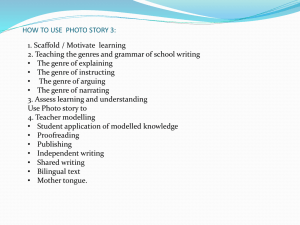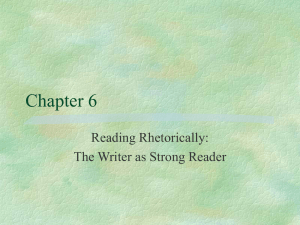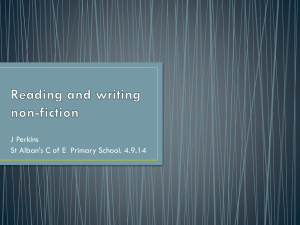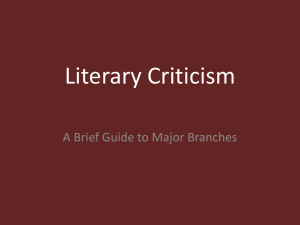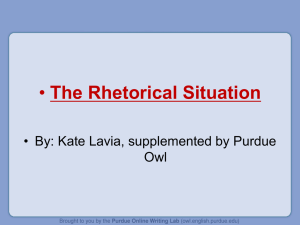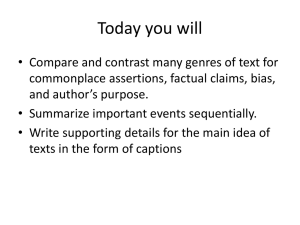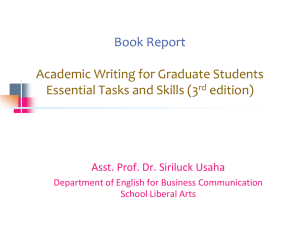Genre Criticism
advertisement
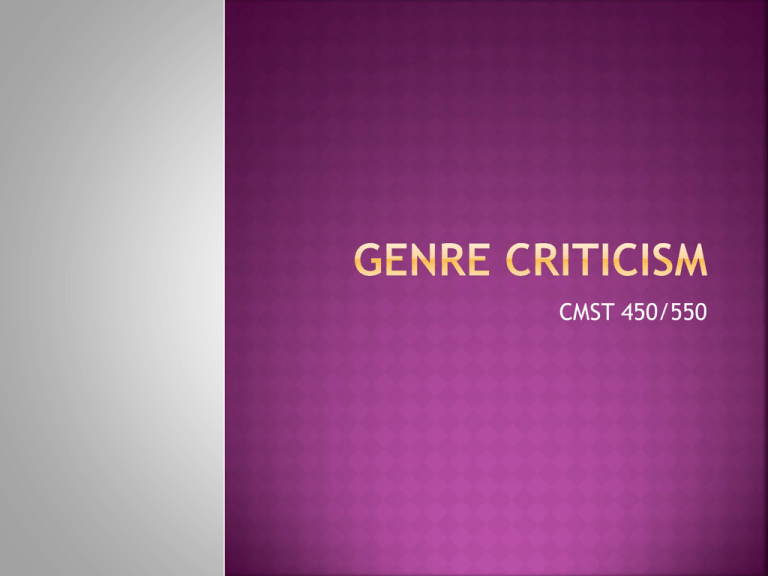
CMST 450/550 •Genre began as an absolute classification system in ancient Greece. Poetry, prose and performance had a specific and calculated style that related to the theme of the story. •During the Enlightenment period in 18th century Europe, the system of patronage began to change. • Genre became a dynamic tool to help the public make sense out of unpredictable art. •Because art is often a response to a social state, in that people write/paint/sing/dance about what they know about, the use of genre as a tool must be able to adapt to changing meanings. “Although this particular method had been around for decades prior, genre criticism first gained modern attention in 1978 thanks to Campbell and Jamieson’s article Form and Genre in Rhetorical Criticism: An Introduction. Campbell and Jamieson explain that genre criticism can be called an ‘orderly means of close textual analysis’ (p. 414). They go on to say that those who perform generic criticism are held to a certain set of constraints (p. 415).” Classification is justified only by the critical illumination it produces, not by the neatness of a classificatory schema. Generic criticism is taken as a means toward systematic, close textual analysis. A genre is a complex, an amalgam, a constellation of substantive, situational, and stylistic elements. Generic analysis reveals both the conventions and affinities that a work shares with others; it uncovers the unique elements in the rhetorical act, the particular means by which a genre is individuated in a given case. CRITICISM OF THE CRITICICAL APPROACH: John H. Patton and Thomas M. Conley have argued that genre criticism requires too much critical distance between the text and the reader and thus leads to assessments that are not fully responsible. Genre criticism, they contend, invites reductionism, rules, formalism. Patton believes that such analysis results in "critical determinism of the worst sort,” and Conley that it leads to “tiresome and useless taxonomies.” AND YET…. The urge to classify is fundamental, and although it involves the difficulties that Patton and Conley point out, classification is necessary to language and learning. There are many ways one might classify discourse, but if the term "genre" is to mean anything theoretically or critically useful, it cannot refer to just any category or kind of discourse. One concern in rhetorical theory, then, is to make of rhetorical genre a stable classifying concept; another is to ensure that the concept is rhetorically sound. Abstract: Genre analysis is a form of rhetorical criticism that determines criterion on which to evaluate similar forms of oratory. This method was used to analyze six presidential nomination acceptance speeches given from 1960 to 2008. Six criteria were found to be unique to nomination acceptance speeches. In addition, several rhetorical strategies commonly used by the orators were identified. Background literature is provided in the areas of campaign rhetoric, rhetorical criticism and genre analysis, and political spectacle and presidential discourse. Special attention is paid to the relationship between Barack Obama’s nomination acceptance speech in comparison with the other examples. Implications for further research are also discussed. Six critieria for (presidential candidate) party nomination acceptance speeches: 1.The presence of forensic, epideictic, and deliberative segments; 2.Acknowledgement of belief in a higher power; 3.Reference to political icons; 4.Acclaiming and attacking the opponent; 5.Demonstrating allegiance to the party; and 6.Uniting the American people through the communal “we.” Excerpt: 2012 furthers the formula that we have come to expect from disaster films. Jackson struggles, almost dies, but in the end is reunited with his family to go on to live in a changed (but still inhabitable) world. He is also grateful to Charlie for giving him and his family a chance to escape annihilation. Adrian, the geologist, persuades the [governing powers] to let more innocent civilians aboard the arks…perhaps also winning the affections of the president’s daughter. And finally, Carl is humiliated when his efforts to keep the world ignorant of the [impending] disaster are revealed. Many of the characters we have become acquainted with throughout the film still live on. The filmmakers assume that this formula works for the viewer: (1) the will to survive is strong, and (2) there is always a way when people fight for their chance at survival. The films analyzed in this essay include Independence Day (1996), Dante’s Peak (1997), and 2012 (2009). All three films share the following generic criteria: 1. One or more (unlikely?) “heroes” trying to survive the disaster; 2. A recurring theme that the government will step in and find a solution to the problem; 3. The plot features a conspiracy theorist or the one who believes something others don’t but is eventually proven to be right all along; 4. The plot features a saboteur, someone who attempts to thwart the hero’s efforts for self-interested gain; and 5. The overarching premise that disaster will unite us (at least the good guys) together.
